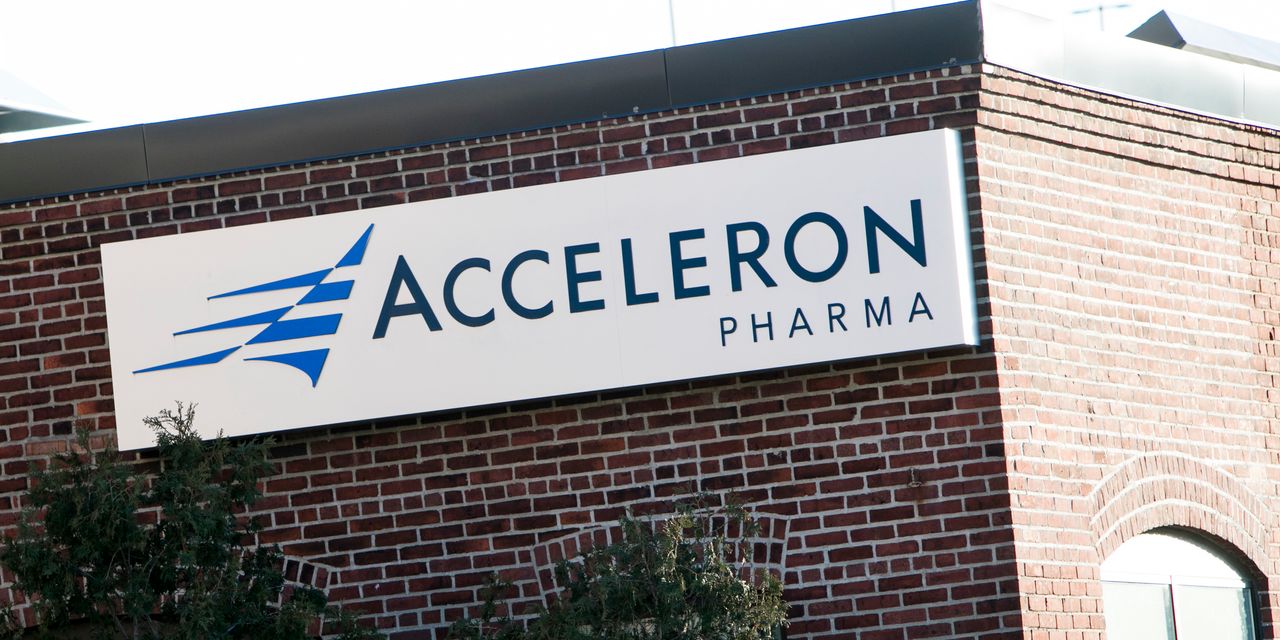
Merck MRK -0.34% & Co. is in advanced talks to acquire Acceleron Pharma Inc., XLRN 6.69% according to people familiar with the matter, in a move that would bolster the pharmaceutical giant’s rare-disease business.
The deal for Acceleron, which has a market value of around $11 billion, could be announced this week, assuming talks don’t fall apart, the people said.
Should a deal come together, it would be one of Merck’s biggest and represent a bet on the treatments for the respiratory and blood diseases that Acceleron specializes in.
Merck appears to have beaten out other potential suitors for Acceleron including Bristol Myers Squibb Co., which already owns a big stake in the company.
Acceleron’s crown jewel is an experimental drug for pulmonary arterial hypertension, a disease caused by high pressure in the blood vessels leading from the heart to the lungs. The condition leads to less oxygen in the blood.
Companies including Johnson & Johnson sell pulmonary arterial hypertension therapies. Yet Acceleron’s drug, called sotatercept, promises to be the first that doesn’t just treat symptoms and slow down the disease, but could potentially stop it.
Pulmonary arterial hypertension is a multibillion-dollar market. In 2017, J&J paid $30 billion for Swiss drugmaker Actelion and its pulmonary hypertension drugs. The drugs notched $1.7 billion in world-wide sales during the first six months of this year.
The promise of sotatercept has helped light a fire under Acceleron’s shares in the past couple of years and swelled its market value. The Cambridge, Mass., biotechnology company’s stock ran up further Friday after Bloomberg reported that it was in talks to be acquired by an unnamed buyer.
Merck has a market value of about $185 billion.
Bristol Myers, which owns 11.5% of Acceleron, has financial claims over the biotech’s products. For sotatercept, Acceleron is required to pay Bristol-Myers a royalty in the low-20% range of global net sales if the drug is approved and commercialized to treat PAH, according to Acceleron’s 2020 annual report.
In hematology, Acceleron sells Reblozyl, which is used to boost patients’ hemoglobin levels. It is currently available in the U.S., Europe and Canada to treat certain adult patients.
In the case of Reblozyl, Bristol Myers is in line to earn the lion’s share of annual sales, which it and Acceleron estimate could peak at more than $4 billion for all currently approved indications and those in development.
Acceleron, meanwhile, is entitled to receive tiered royalty payments on net sales of the drug in the low-to-mid 20% range, according to the annual report.
Merck’s pursuit of Acceleron follows the completion in June of the spinoff of a collection of slower-growth assets, including its women’s-health products and cholesterol treatments, into a new publicly traded company called Organon & Co.
That move, which was announced last year, paved the way for the New Jersey-based drugmaker to focus on growth areas including cancer, vaccines and animal health.
Buying Acceleron would be consistent with the strategy of other big pharmaceutical companies, which use acquisitions as a faster way of gaining access to new drugs than developing them in-house over a longer period.
Healthcare is typically one of the busiest areas for deals. Companies in the sector have struck $292 billion worth of transactions so far this year, according to Dealogic. But megadeals have been less plentiful this year than in the last few years.
Earlier this month, Baxter International Inc. struck a $10.5 billion deal to acquire rival medical-equipment maker Hill-Rom Holdings Inc. Globally, companies in the industry have struck about $444 billion worth of takeover deals so far this year, more than double the pace of the comparable period in 2020, according to Dealogic.
—Jonathan D. Rockoff contributed to this article.
Write to Cara Lombardo at [email protected] and Ben Dummett at [email protected]
Copyright ©2021 Dow Jones & Company, Inc. All Rights Reserved. 87990cbe856818d5eddac44c7b1cdeb8








